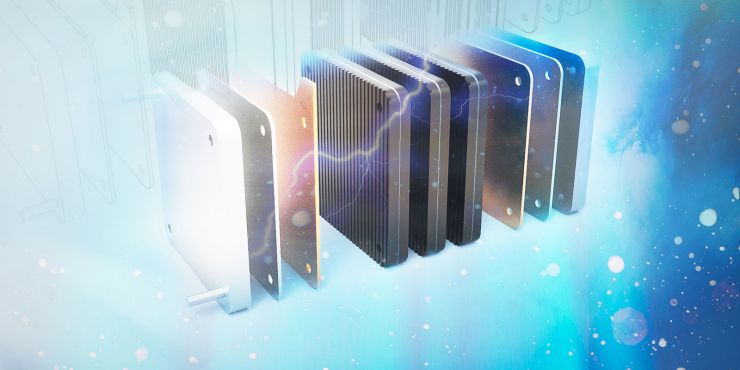
Zero-emission rail travel
How clean fuel cells have the potential to replace dirty diesel

Powered by hydrogen and emitting nothing more than water, fuel cells have been widely discussed as the solution of future train mobility. Already in use on industrial sites to power forklift trucks, for example, they are a promising drive technology for cars. But their potential doesn’t end on the road. Recent studies have shown that fuel-cell-hydrogen (FCH) trains may be a viable proposition.
To date, trials and demonstrations for FCH trains have been limited to around 20 so far. However, interest in FCH trains from countries around the world is growing. Manufacturers have been partnering with fuel cell technology suppliers like Freudenberg to develop and test first working prototypes.
As Felix Herberg, Sales Manager Automotive Filters, explained: “Fuel cell vehicles – a category that is increasingly being extended to include trains – are particularly well suited for long distances thanks to their great range. With battery-powered electric drives being used for shorter distances, this alternative drive technology perfectly complements the sustainable mobility mix of tomorrow.”
Transparent benefits
It is becoming apparent that FCH technology can be commercially competitive on non-electrified routes of 100 km or longer, or for low-use routes with up to 10 trains per day. Apart from the environmental advantages, FCH trains offer a number of benefits. They are especially suitable for “last mile delivery” routes while fast refueling means short downtimes and rapid turnaround. They can also manage long operating periods of more than 18 hours without refueling. In many cases, FCH trains represent a clean and economically feasible alternative to conventional diesel power. This is especially true where electricity costs are relatively low and access to the necessary refueling and electrolyzer infrastructure is easy. From an economic perspective, battery-powered trains may appear a more cost-effective option, but they are disadvantaged by operational constraints related to their limited range.
Proven potential
A recent major EU project that analyzed ten selected case studies across Europe has shown significant market potential for FCH technology in rail.[Source] Assuming a ready and cheap supply of hydrogen and low-cost electricity, this technology provides a flexible, zero-emission way to replace diesel trains as Europe in particular seeks to permanently reduce transport-related CO2 emissions. Nevertheless, there are structural barriers that must be addressed before we can expect to see widespread use of FCH trains.The biggest challenges include the need to develop a standard, scalable design issues with fuel cell stack operating hours, battery storage capacity and, the necessity of developing an appropriate funding model.
Possible rollout timetable
Assuming these hurdles are overcome, it is possible that as many as one in five new train vehicles in Europe could be powered by hydrogen as early as 2030. The latest developments in Germany and France involving multiple units show the potential for FCH trains to slot in alongside electrification as part of a wider goal to make rail transport entirely carbon neutral. The case studies analyzed in the EU report indicate that FCH trains can perform their tasks as well as diesel. In regions where the electricity needed to produce hydrogen is cheap – such as Scandinavia – the cost comparisons become even more attractive. In addition, FCH trains can commercially outperform catenary electrification where service frequencies are low, and they do not suffer the range limitations of battery power.
On track to the future
Bringing this exciting technology to maturity will require a systematic approach if the sector is to achieve accelerated deployment. Alongside the development of the core technology, contributing factors will be a sustainable decrease in energy prices and a widening of the H2 infrastructure. The increase in fuel cell car use will act as a parallel driver.
Freudenberg fuel cell expertise
Freudenberg has been involved in this exciting technology since its earliest days. Our core focus is on developing intake air filters and humidifiers that are specifically tailored to the requirements of fuel cells. The efficiency of fuel cells relies heavily on the purity of the intake air and we have made progressive developments in this segment for over two decades. As market leader in this specialty segment, we offer a comprehensive portfolio of standardized products as well as custom-tailored systems. You can find more details here. We look forward to continuing to play a key role in the development of this promising technology.
 automotive filtration insight
automotive filtration insight